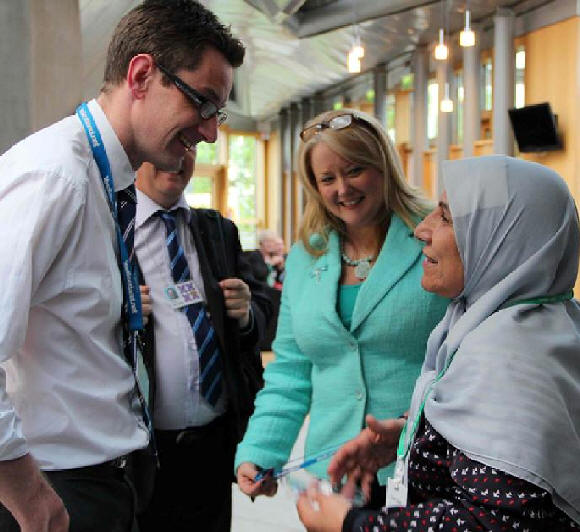|
As our
national bard, Rabbie Burns, put it so well back in 1792, “The Rights of
Woman merit some attention” and that’s my theme for this week. You can
read the whole poem here:
http://www.robertburns.org/works/384.shtml
Women
of all ages, backgrounds, cultures and nationalities have been top of my
agenda this week in a whole host of different and important ways.
You’ll
probably recall that last week the Scottish Parliament (www.scottish.parliament.uk)
had a visit from the 58 US delegates of the National Conference of State
Legislature (NCSL) which I told you about in the last blog.
I met
some really interesting and active people. One who especially made an
impact was Senator Leticia Van de Putte (www.vandeputte.senate.state.tx.us)
from Texas. It was after she returned home that she really hit the
headlines.
In
spite of the sudden and tragic death of her father in a road accident,
Leticia was in the Senate within a few days demanding a voice for our
gender. In a debate about a dramatic and sudden reduction in available
clinics to terminate an unwanted pregnancy, Ms Van de Putte asked: “At
what point must a female senator raise her hand or her voice to be
recognised over her male colleagues?” The Chamber erupted in cheers.
There were hundreds in the gallery and many more outside the building.
In
fact, thousands showed up to offer testimony and didn’t get the chance
that they have in US law to express their views to the Senate on the
proposed Women’s Health Care Bill.
The
filibuster meant that the verbal vote on abortion clinics had to be
abandoned since no one could hear the ayes and nos.
As
Leticia Van de Putte said: “Unfortunately some of my Senate colleagues
do not believe in trusting women with their reproductive organs. It’s
amazing to me that they do not trust women with a choice, but they trust
them with a child.

Texas Senator Leticia Van
de Putte
“We
advocates of reproductive choices often say that we want to make
abortion safe, legal and rare. While those who push anti-choice
legislation will never agree with us on the ‘legal’ part, I think we can
agree on the other tow. But the ‘rare’ part cannot come from making
abortion inaccessible. It needs to come from making it unnecessary.”
I look
forward to meeting with Leticia Van de Putte when she returns to
Scotland, which she has said she plans to do.
If
only men gave birth.
That
in turn reminds me of a rather more male political tale. It’s one that
Electric Scotland recalled the other day and it tells the tale of a Mr.
Quirk who wished to purchase a parliamentary seat in the House of
Commons for his son, George. He told his son: “It is a very honourable
situation for young men who have nothing to do; and it requires neither
application nor study.”
“I
should be glad to know what is absolutely requisite then,” said George.
“Only
that you should be able to say Aye or No,” responded his sponsor with
some alacrity.
But
back in the real world of modern politics…the SNP is striving to get
more women involved in politics. We’re interested in the same issues as
the men but somehow we’re apt to be presented as the background people
who look after the children, family, cooking and elderly relatives.
Don’t get me wrong, we certainly do those tasks and we care about them.
What bothers me is that women don’t yet seem to be seen as part of the
democratic framework of what politics is. Our status ought to be
automatically equal. We shouldn’t have to still be fighting to try to
achieve it.
Or in
the words of Burns:
“There
was, indeed, in far less polish’d days,
A time, when rough rude men had naughty ways,
Would swagger, swear, get drunk, kick up a riot,
Nay even thus invade a Lady’s quiet.”

Those
“far less polish’d days” still seem to be with us in terms of any kind
of gender equality. I was angered to see that the UK Government
is set on removing what’s called the Equality Duty in an upcoming
review. This is a public sector mechanism by which government policies
are assessed to ascertain the impact that they will have on women,
minorities and disadvantaged groups.
The
Fawcett Society’s report (http://tinyurl.com/np7acu)
headed: Red Tape, Red Line: five reasons why government should not “drop
its duty” to tackle women’s inequality sets out its reasons below:
 In
times of austerity we need more, not less, action from government and
the wider public sector to tackle women’s inequality. In
times of austerity we need more, not less, action from government and
the wider public sector to tackle women’s inequality.
 It
would send a clear signal that government does not take its
responsibility towards gender equality seriously. It
would send a clear signal that government does not take its
responsibility towards gender equality seriously.
 The
Equality Duty ensures a common sense approach to business planning,
allowing public bodies to build in equality considerations from the
outset – prevention is better than cure. The
Equality Duty ensures a common sense approach to business planning,
allowing public bodies to build in equality considerations from the
outset – prevention is better than cure.
 Scrapping the Equality Duty could generate additional bureaucracy and
cost to the public purse.
Scrapping the Equality Duty could generate additional bureaucracy and
cost to the public purse.
 It
places the UK ahead of many other countries on translating equality
principles into practice. It
places the UK ahead of many other countries on translating equality
principles into practice.
I’ve put up a Chamber
Motion on the subject, which sets out the danger of this kind of Tory
approach. At the moment, public bodies need to consider equality for
everyone when carrying out their day-to-day work but the move to remove
that responsibility would result in disenfranchising many people.
To add insult to injury,
the Westminster Government has slashed the annual budget of the Equality
and Human Rights Commission from £70 million when it started in 2007 to
£17 million this year and has stripped its powers back.
And speaking of fairness
and equality in action, an independent Scotland would be equipped to
make its own decisions in areas such as asylum and refugee support.
I had a meeting a few
days ago with Rachel Farrier of the Refugee Survival Trust (www.rst.org.uk).
You might recall I hosted a reception with some of these folk just
before the recess. Rachel came into the Parliament to explain her
anxiety about the way in which asylum seekers and refuges are held back
from access to work or benefits because they can’t get a National
Insurance (Social Security) number from the Westminster Department of
Work and Pensions.

That means that people
who are effectively destitute may get leave to remain in the UK but
can’t secure any means to live. Already homeless and isolated, these
people are pushed into a bleak underground or onto the streets.
We are now looking at
ways in which we could try to resolve this situation. That, in turn, led
us on to a discussion about what an Independent Scotland might do on
immigration issues. I suggested that this SNP-led Government has a very
positive track record and that must be a good indicator that a Scottish
system would be far more supportive and humane than anything provided by
London.
Another important reason
for a Yes vote on 18 September 2014.
Tasmina Ahmed-Sheikh (www.tasmina.eu),
the only SNP woman on the shortlist of six candidates for the European
elections, works very hard to help women in the Party build confidence
and the kind of presentation skills you need to get yourself an elected
position.
As National Women’s
Officer for the Party, Tasmina is running a Women’s Academy Workshop in
Stirling on 14 September with sessions focusing on achieving the kind of
confidence and charisma that Tasmina just seems to have so naturally.
She also featured on the
BBC Politics Scotland show as Parliament went into recess. The programme
was about the current status of the Independence debate and Tasmina was
up against the former leader of the Scottish Tories, Annabel Goldie.
It’s well worth watching: (http://tinyurl.com/BBC-Sunday-Politics-Scotland)
My apologies to American readers who won’t be able to see this without a
VPN! |

